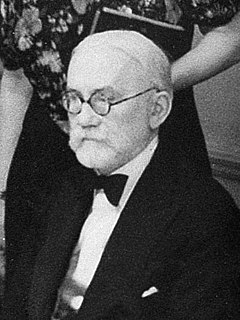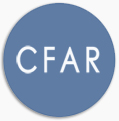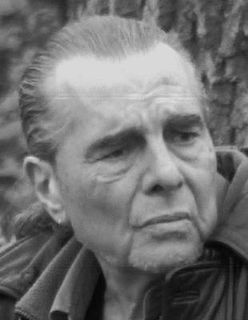Related Research Articles

Jacques Marie Émile Lacan was a French psychoanalyst and psychiatrist. Described as "the most controversial psycho-analyst since Freud", Lacan gave yearly seminars in Paris from 1953 to 1981, and published papers that were later collected in the book Écrits. His work made a significant impact on continental philosophy and cultural theory in areas such as post-structuralism, critical theory, feminist theory and film theory, as well as on the practice of psychoanalysis itself.
Psychoanalysis is a set of theories and therapeutic techniques that deal in part with the unconscious mind, and which together form a method of treatment for mental disorders. The discipline was established in the early 1890s by Austrian neurologist Sigmund Freud, who developed the practice from his theoretical model of personality organization and development, psychoanalytic theory. Freud's work stems partly from the clinical work of Josef Breuer and others. Psychoanalysis was later developed in different directions, mostly by students of Freud, such as Alfred Adler and his collaborator, Carl Gustav Jung, as well as by neo-Freudian thinkers, such as Erich Fromm, Karen Horney, and Harry Stack Sullivan.

Anna Freud was a British psychoanalyst of Austrian-Jewish descent. She was born in Vienna, the sixth and youngest child of Sigmund Freud and Martha Bernays. She followed the path of her father and contributed to the field of psychoanalysis. Alongside Hermine Hug-Hellmuth and Melanie Klein, she may be considered the founder of psychoanalytic child psychology.

Helene Deutsch was a Polish American psychoanalyst and colleague of Sigmund Freud. She founded the Vienna Psychoanalytic Institute. In 1935, she immigrated to Cambridge, Massachusetts, where she maintained a practice. Deutsch was one of the first psychoanalysts to specialize in women. She was a Fellow of the American Academy of Arts and Sciences.
Lisa Appignanesi is a British-Canadian writer, novelist, and campaigner for free expression. Until 2021, she was the Chair of the Royal Society of Literature, and is a former President of English PEN and Chair of the Freud Museum London. She chaired the 2017 Booker International Prize won by Olga Tokarczuk.
In classical Freudian psychoanalytic theory, the death drive is the drive toward death and destruction, often expressed through behaviors such as aggression, repetition compulsion, and self-destructiveness. It was originally proposed by Sabina Spielrein in her paper "Destruction as the Cause of Coming Into Being" in 1912, which was then taken up by Sigmund Freud in 1920 in Beyond the Pleasure Principle. This concept has been translated as "opposition between the ego or death instincts and the sexual or life instincts". In Pleasure Principle, Freud used the plural "death drives" (Todestriebe) much more frequently than the singular.
Juliet Mitchell is a British psychoanalyst, socialist feminist, research professor and author.
André Green was a French psychoanalyst.
Hermann/Herman Nunberg was a psychoanalyst and neurologist born in Będzin, Poland.

Élisabeth Roudinesco is a French historian and psychoanalyst, affiliated researcher in history at Paris Diderot University, in the group « Identités-Cultures-Territoires ». She also conducts a seminar on the history of psychoanalysis at the École Normale Supérieure. Biographer of Jacques Lacan and Sigmund Freud, she mainly worked on the situation of psychoanalysis worldwide but also published on the history of French Revolution, perverts and perversion, philosophy and Judaism. She has been awarded The Prix Décembre 2014 and The Prix des Prix 2014 for her biography of Freud, Freud, In his Time and Ours published by Harvard University Press. Her work has been translated into thirty languages.
Robert Douglas Hinshelwood is an English psychiatrist and academic. He is a Professor of Psychoanalytic Studies at the University of Essex. He trained as a doctor and psychiatrist. He has taken an interest in the Therapeutic Community movement since 1974, and was founding editor of The International Journal of Therapeutic Communities, having edited. with Nick Manning, Therapeutic Communities: Reflections and Progress.
Identification is a psychological process whereby the individual assimilates an aspect, property, or attribute of the other and is transformed wholly or partially by the model that other provides. It is by means of a series of identifications that the personality is constituted and specified. The roots of the concept can be found in Freud's writings. The three most prominent concepts of identification as described by Freud are: primary identification, narcissistic (secondary) identification and partial (secondary) identification.

James Beaumont Strachey was a British psychoanalyst, and, with his wife Alix, a translator of Sigmund Freud into English. He is perhaps best known as the general editor of The Standard Edition of the Complete Psychological Works of Sigmund Freud, "the international authority".
Mikkel Borch-Jacobsen is a Professor of Comparative Literature and French at the University of Washington in Seattle, and the author of many works on the history and philosophy of psychiatry, psychoanalysis and hypnosis. Born to Danish parents, he began his studies in France and emigrated to the United States in 1986. His constructivist analysis of the co-production of psychical "facts" emphasises the accuracy of historical accounts of mental disorders.
The Independent or Middle Group of British analysts represents one of the three distinct sub-schools of the British Psychoanalytical Society, and 'developed what is known as the British independent perspective, which argued that the primary motivation of the child is object-seeking rather than drive gratification'. The 'Independent group...is strongly associated with the concept of countertransference as well as with a seemingly pragmatic, anti-theoretical attitude to psychoanalysis'.

Centre for Freudian Analysis and Research (CFAR) is a psychoanalysis research, training and low-cost treatment centre located in London, United Kingdom. CFAR is a member organisation of the United Kingdom Council for Psychotherapy. CFAR operates within the psychoanalytic tradition of Sigmund Freud and Jacques Lacan.

Freud and Philosophy: An Essay on Interpretation is a 1965 book about Sigmund Freud, the founder of psychoanalysis, written by the French philosopher Paul Ricœur. In Freud and Philosophy, Ricœur interprets Freud's work in terms of hermeneutics, a theory that governs the interpretation of a particular text, and discusses phenomenology, a school of philosophy founded by Edmund Husserl. He addresses questions such as the nature of interpretation in psychoanalysis, the understanding of human nature and the relationship between Freud's interpretation of culture amongst other interpretations. The book was first published in France by Éditions du Seuil, and in the United States by Yale University Press.
Lacanianism or Lacanian psychoanalysis is a theoretical system that explains the mind, behaviour, and culture through a structuralist and post-structuralist extension of classical psychoanalysis, initiated by the work of Jacques Lacan from the 1950s to the 1980s. Lacanian perspectives contend that the world of language, the Symbolic, structures the human mind, and stress the importance of desire, which is conceived of as endless and impossible to satisfy. Contemporary Lacanianism is characterised by a broad range of thought and extensive debate between Lacanians.

Richard Appignanesi is a Canadian writer and editor. He was the originating editor of the internationally successful illustrated For Beginners book series, as well as the author of several of the series' texts. He is a founding publisher and editor of Icon Books. He was founding editor of the Manga Shakespeare series. He is a former executive editor of the journal Third Text, and reviews editor of the policy studies journal Futures.
Bruce Fink is an American Lacanian psychoanalyst and a major translator of Jacques Lacan. He is the author of numerous books on Lacan and Lacanian psychoanalysis, prominent among which are Lacan to the Letter: Reading Écrits Closely, The Lacanian Subject: Between Language and Jouissance (1995), Lacan on Love: An Exploration of Lacan's Seminar VIII and A Clinical Introduction to Lacanian Psychoanalysis: Theory and Technique.
References
- ↑ https://jcfar.org.uk/wp-content/uploads/2016/03/The-Not-All-Darian-Leader.pdf [ bare URL PDF ]
- ↑ Susanna Rustin "Getting in Touch" The Guardian, 26 January 2008.
- ↑ "Interview with Darian Leader".
- ↑ 'Cambridge University Tripos results' Times, 10 July 1986.
- ↑ Leader, D. (9 April 2009). "Talking therapy". The Guardian. London.
- ↑ Leader, D (2010). "Therapy shows us life is not neat or safe. So why judge it by those criteria?". University of Roehampton. Archived from the original on 13 May 2013. Retrieved 28 April 2013.
- ↑ Leader, D. (9 September 2008). "A quick fix for the soul". The Guardian. London.
- ↑ Leader, D. (21 June 2011). "How psychiatry became a damage limitation exercise". The Guardian. London.
- ↑ Leader, D. (29 July 2011). "Anders Behring Breivik and the logic of madness". The Guardian. London.
- ↑ Leader, D. "Darian Leader interviewed about the marketing of depression".[ dead YouTube link ]
- ↑ Leader, D. (2011). "What is Madness?". RSA. Archived from the original on 1 October 2013.
- ↑ Leader, D. (6 November 2012). "Nail biting doesn't belong in psychiatry's list of OCD symptoms". The Guardian. London.
- ↑ Leader, D. (26 April 2013). "Bipolar memoirs: What have I done?". The Guardian. London.
- ↑ "Psychoanalysis - the College of Psychoanalysts UK". Archived from the original on 2 November 2013. Retrieved 28 April 2013.
- ↑ "Research Centre for Therapeutic Education - Members". Archived from the original on 17 July 2020.
- ↑ Kupferschmidt, Phyla. "Cardinal Mercier Chair 2015: An interview with Darian Leader".
{{cite journal}}: Cite journal requires|journal=(help) - ↑ Radin, Victoria (19 November 1997). "Wednesday's Book: Promises Lovers Make When It Gets Late by Darian Leader". London: The Independent, Wednesday, 19 November 1997.
- ↑ Faber, & Faber. "Freud's Footnotes: Darian Leader". 7 February 2000. Archived from the original on 16 September 2008.
- ↑ Herman, David. "Stealing the Mona Lisa: what art stops us from seeing by Darian Leader". London: The Independent, Tuesday, 19 March 2002. Archived from the original on 24 May 2011.
- ↑ Appignanesi, Lisa (18 February 2007). "Sick in the head". London: The Observer, Sunday 18 February 2007.
- ↑ Mantel, Hilary (24 February 2007). "All in the mind?". London: The Guardian, Saturday 24 February 2007.
- ↑ Hanif Kureishi, Christopher Tayler (11 March 2007). "Christopher Tayler & Hanif Kureishi review Why Do People Get Ill?". London: The Telegraph, 11 March 2007.
- ↑ Jeffries, Stuart (23 February 2007). "Talking cure". London: The Guardian, Friday 23 February 2007.
- ↑ Leith, William (5 March 2008). "The New Black: Mourning, Melancholia and Depression by Darian Leader". London: The Telegraph, 12:02AM GMT 5 March 2008.
- ↑ Kureishi, Hanif. "The Sadness Epidemic". New Statesman, 21 February 2008.
- ↑ Appignanesi, Lisa (25 January 2008). "The New Black, By Darian Leader". London: The Independent, Friday, 25 January 2008.
- ↑ Mantel, Hilary (2 February 2008). "Anatomy of melancholy". London: The Guardian, Saturday 2 February 2008.
- ↑ Linklater, Alexander (9 October 2011). "What is Madness? by Darian Leader – review". London: The Observer, Sunday 9 October 2011.
- ↑ Rose, Jacqueline (1 October 2011). "What Is Madness? by Darian Leader – review". London: \The Guardian, Thursday 29 September 2011.
- ↑ Shakespeare, Nicholas (24 October 2011). "What Is Madness? by Darian Leader: review". London: The Telegraph, 24 October 2011.
- ↑ Kureishi, Hanif (7 October 2011). "What is Madness?, By Darian Leader – Review". London: The Independent, Friday, 7 October 2011.
- ↑ Linklater, Alexander (6 May 2013). "Strictly Bipolar by Darian Leader – review". London: \The Guardian, Monday 6 May 2013.
- ↑ Baggini, Julian (13 June 2016). "Hands: What We Do With Them – and Why by Darian Leader – review". London: \The Guardian, Monday 13 June 2016.
- ↑ Grant, Colin (3 March 2019). "Why Can't We Sleep? by Darian Leader review – in search of the land of nod". The Observer. ISSN 0029-7712 . Retrieved 6 February 2020.